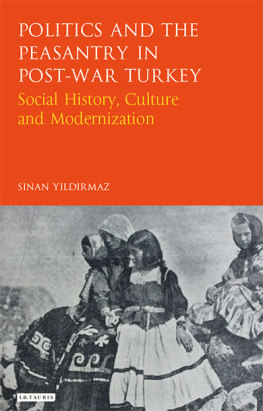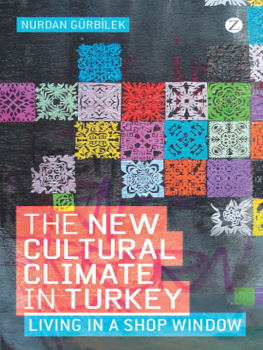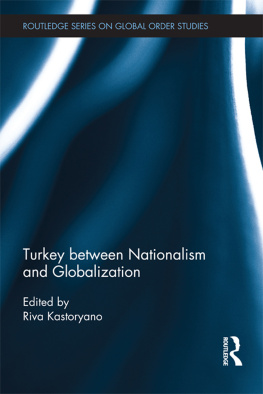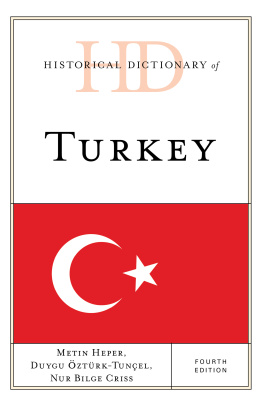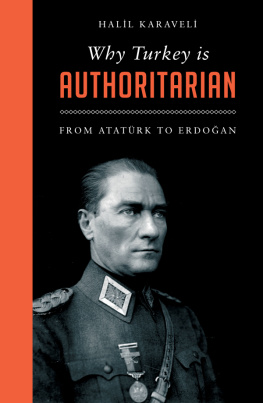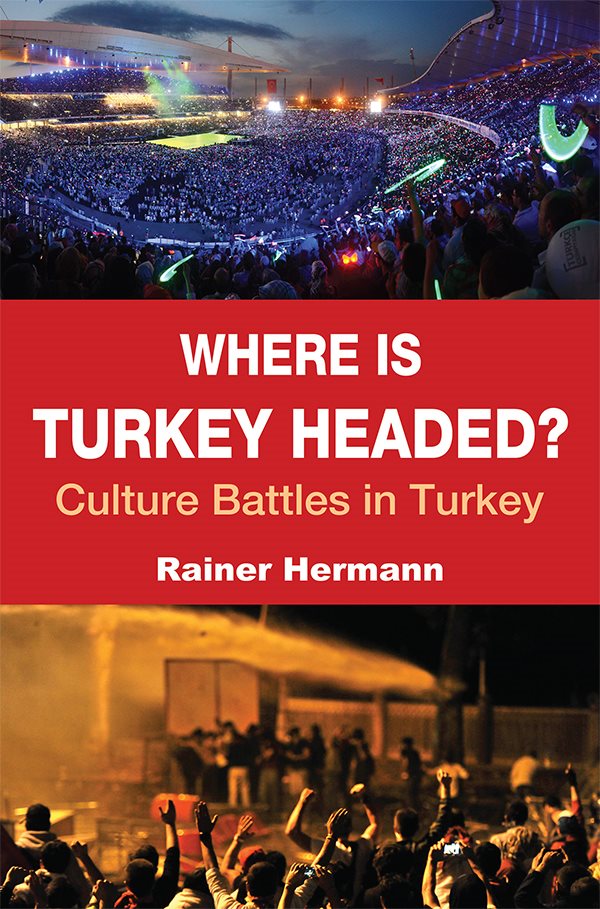WHERE IS
TURKEY HEADED?
Culture Battles in Turkey
Rainer Hermann

Copyright 2014 by Blue Dome Press
Originally published in German as Wohin geht die Trkische Gesellschaft?
Kulturkampf in der Trkei in 2008
17 16 15 14/2 3 4 5
All rights reserved. No part of this book may be reproduced or transmitted in any form or by any means, electronic or mechanical, including photocopying, recording or by any information storage and retrieval system without permission in writing from the Publisher.
Published by Blue Dome Press
535 Fifth Avenue, Ste.601
New York, NY 10017-8019
www.bluedomepress.com
Library of Congress Cataloging-in-Publication Data Available
Epub
Ahmet Kahramanoglu
DIJITAL ISBN: 978-1-935295-72-3
Cover photos by Cihan News Agency. Top photo: Turkish Olypiads finale at Istanbul Atatrk Olimpiyat Stadium in front of 250,000 spectators on June 15, 2013. Bottom photo: 2013 Gezi Protests against the governments urban development plan for Istanbuls Taksim Gezi park which developed into mass protests all over Turkey.
Translated by Betsy Mayer
Printed by
alayan A.., Izmir - Turkey
Acknowledgments
I would like to thank the staff editors of the Blue Dome Press for their astute editing of the English text. I also would like to sincerely thank three friends who proofread the German manuscript and saved it from mistakes: Felix Krner, Siegfried Nauhaus, and Christoph Neumann. I would never have understood Turkey without having discussed it in detail with ahin Alpay, shak Alaton, and Aydn Engin. They showed me the way, and I would like to thank them especially. I would also like to thank Ruth, my daughter, who was the first critical reader of the manuscript. The remaining mistakes and shortcomings are my very own.
Mostly, I would like to thank Ursula Hermann. I would never have left for the banks of the Bosporus without her and without her patience, understanding, and love, this book would never have been written.
Preface
A fter seventeen years of living in Turkey, the author decided to take stock. Of course, many books have already been written about Turkey. Most of them are either chronological histories of events that orient themselves along dates or colorful reports describing what it is like to live in this fascinating country. This book wants to achieve something quite different. Turkey has changed a great deal in the last two decades; the country is in flux. The impulse for this flux always originates with a society that has discovered its diversity and is pushing back omnipotent government control. The book describes the transition Turkish society has undergone, and it ponders how this transition has changed the politics, economy, and culture.
The author is an economist and scholar of Islamic studies. This has had an impact on his point of view. As an economist, he learned to think systematically and to have an interest in the processes within these systems. He set off to Turkey in 1991, as an Islamic scholar with a good working knowledge of the countrys history, culture, and religion, and also with affection for its people. The author was very lucky, as he could not have completed his interdisciplinary studies at four universities, in four countries, if he followed the way todays academic system operates.
The book is divided into three main chapters. Chapter One describes the basic order of the Republic of Turkey, the urban elite of the state, and its dogmas. Chapter Two describes how Anatolian underdogs became Turkeys counter-elite, the path that led them into government, and their conflicts with the old elite. Chapter Three describes the darker aspects of Turkey today, including disadvantaged groups and violence, as well as the nicer aspects of Turkeys relations with Germany, and its lively cultural scene. All chapters of the book are newly introducted to the audience, except for the four reports at the end of the subchapters, which appeared in the Frankfurter Allgemeine Zeitung daily newspaper. The author was an eye-witness to most of what he described; sometimes he even participated in the encounters.
Istanbul, March, 2008
Preface to the English Edition
Wrong turn of the once-reform government
Quo vadis, the AK Party?
T hings change quickly in the sociopolitical sphere. Since the first publication of Rainer Hermanns Where Is Turkey Headed? Culture Battles in Turkey , the political landscape in Turkey has shifted significantly. In 2007, the AK Party government, led by Prime Minister Recep Tayyip Erdoan, was viewed, both at home and abroad, as being a reform government, fighting the long entrenched deep state and democratizing Turkey.
The European-Union inspired democratic reforms that were introduced during the ruling AK Partys first term in office were welcomed by Turkish society as it hoped to cast off its anti-democratic straightjackets, one after another. In the spring of 2010, the Parliament, following the lead of Prime Minister Erdoan, further accepted a series of sweeping constitutional reforms. These constitutional amendments did not, however, achieve the required two-thirds majority in the Parliament to immediately implement the changes at that time; therefore, it was put to a referendum on September 12, 2010. These reformswhich curbed the power of military courts, making the military more accountable to the civilian courts, abolished the immunity enjoyed by the generals of the 1980 coup, gave more rights to women and various segments of the society, made the judiciary more accountable, expanded personal freedoms, and limited state power over individualswere hailed by the Enlargement Commissioner in the European Union as a step in the right direction as they address a number of long-standing priorities in Turkeys efforts towards fully complying with the EU accession criteria. In September, 2010, the reforms passed with 58% of the vote. Though there was still work to be done on the democratization front, the reforms were seen as a good starting point.
Partly on the strength of these reforms and the governments promise of replacing the current 1980 coup constitution with a new civic constitution in its third term, the AK Party won its third term in power in the 2011 general elections, this time with an unprecedented 50% of the vote. Right after this landslide victory, Erdoan declared that the first term of his government was their apprentice period, the second term, their journeyman period, and the third term would be their mastership period ( Ustalk Dnemi ).
In his reconciliatory balcony speech, Erdoan promised to head a government of all people, not only the 50% who had supported his party. The vast majority of the public had, therefore, high expectations that the government would launch a new wave of reforms in its third term; however, for the Erdoan government, mastership implied expanding its domination over the state. In its third term, the Erdoan government has shifted its priorities significantly, thus proving the outstanding artfulness of its mastership period. It has increasingly been taking on features that heavily contradict its conception of being a democratic reform party. Moving away from earlier reforms, the government has focused on a series of confrontations with opponentsboth real and imagined. The Prime Minister himself is now taking the lead with his harsh and aggressive rhetoric of othering, and even demonizing, some influential people and various segments of society. This aggressive rhetoric has been used to cover up the enormous corruption and graft scandal that erupted in December, 2013, and in many ways, is no different than the dirty rhetoric of reactionaryism ( rtica ) employed once to disguise the siphoning of banks during the 1997 post-modern coup era (See also the Appendices).


